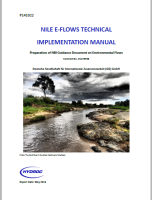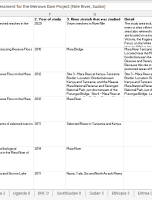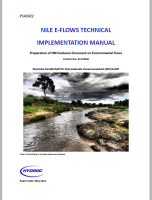Authors
Gordon O’Brien, Chris Dickens, Retha Stassen, Yasir Mahomed, James MacKenzie, Kelly Fouchy Sebastian Bubmann, Georg Petersen, Henry Busulwa, Gedion Asfaw and Melissa Wade.
Abstract
The Nile Basin Initiative (NBI) recognises that the sustainable management of the shared Nile Basin
water
resources requires the establishment of relevant transboundary policy instruments (within the Nile
Basin Sustainability Framework (NBSF)). These policy instruments must conform to the existing
Environmental and Social Policy. The sustainable use of these socio-ecologically important water
resources of the Nile Basin requires the coordinated management of the environmental flows
(E-flows) on meaningful spatial scales. Environmental flows describe the quantity, quality and
timing of water flows required to sustain freshwater and estuarine ecosystems and the human
livelihoods and wellbeing that depend on these ecosystems (Brisbane Declaration, 2007). The NBI
does not currently have any general standards and norms for the establishment of E-flows in the
Basin. To establish general standards and norms for E-flows in the Nile Basin, NBI has initiated a
process to develop a transboundary level strategy document on E- flows. The objective of the
strategy document on E-flows is to develop a structured and scientifically based Nile E-flows
Framework for establishing E-flow requirements and managing flows in the Basin for
transboundary water resources planning purposes.



